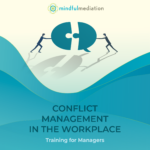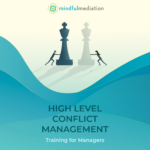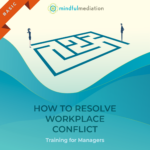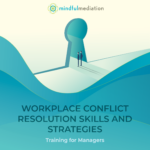Effective workplace conflict resolution helps you overcome workplace conflict fast! Successfully resolving conflict has many benefits:
- strengthens teams and working relationships,
- leads to more creative solutions,
- greater opportunities to learn and grow,
- higher job satisfaction,
- and a more inclusive working environment.
When left unresolved workplace conflict is one of the greatest causes of employee stress, and can have an immeasurable impact on organisational performance.
Taking simple steps to resolve conflict as quickly as possible can prevent many workplace conflicts from escalating.
Our Workplace Conflict Resolution Training is designed to help you implement these simple steps and prevent or reduce the conflict in your organisation.
Failing to resolve conflict quickly and effectively can lead to many challenges to your organisation or business including:
- workers’ compensation or bullying claims,
- ineffective leadership,
- team dysfunction,
- breakdown of workplace relationships,
- loss of talent,
- mistrust,
- demotivation, and
- reduced productivity.
These negative impacts of workplace conflict can be significantly reduced or prevented when managers act quickly to resolve issues between co-workers (or between themselves and co-workers).
Following are some Expert Workplace Conflict Resolution Tips & Strategies to help you prevent the escalation of workplace conflict.
Online Courses
Prevent Conflict Escalation Using Expert Conflict Resolution Tips – For Managers
By A Professional Workplace Mediator
- Take action as quickly as possible. Managers often hope that conflict will go away or repair in time. The reality is that in many cases conflict gets worse over time. Unresolved conflicts can lie dormant for days, weeks, or months, only to explode on another occasion. Or it can lead to workers withdrawing, becoming resentful, and demotivated. Conflict avoidance by managers is one of the main causes of workplace issues escalating. Unresolved conflict is a major cause of formal or informal claims or grievances being lodged. Workers that make claims often feel that no one has listened or done anything effective to resolve the conflict.
- Gather as much information as possible. People often have very different perceptions of what has occurred. Understanding their perceptions will help you to focus on what is important to each person. Ensure these conversations are confidential and private. Listen carefully to ensure you understand each person’s perceptive.
- Perception is reality. Be curious. Focus on how the people involved see the situation, what they need, and what’s important to them. Steer clear from judging who is right or wrong. Often both people have contributed something to the situation. Making judgments or giving your opinion is risky. It can enflame the situation.
- Decide whether to mediate or to call in others to help. Once you have discussed the issues with the people involved, decide whether you are able to mediate yourself. If you are not confident, consider seeking the help of HR or professional external mediators. Managers often successfully resolve simple day-to-day disputes involving two people. Complex and long-standing workplace issues and those involving a number of people are best left for experienced professional mediators. Workplace conflicts are often sensitive and require high-level skill to bring them to a resolution.
- Arrange next steps as soon as possible. While it can be difficult to arrange meetings in busy workplaces, make sure resolving the conflict is one of your top priorities. Generally the longer the conflict goes on for, the more difficult, and expensive it is to resolve. If you are unable to resolve the conflict quickly, keep the people involved updated regularly on what you are doing. This will help to ensure they feel supported, knowing resolving their conflict is a top priority for you.

8 Expert Workplace Conflict Resolution Strategies for Managers To Resolve Day-to-Day Low Level Conflict
The following steps are designed to help you with workplace conflict resolution involving simple day-to-day conflicts between two people. Adapt these steps to suit your needs when resolving conflict in your workplace.
- Arrange to meet with your team members separately. During these private and confidential individual meetings identify the key issues for each person. Look out for what you believe each person is needing (eg. improved communication, empathy, understanding). See if you can find any common ground (eg. they are both committed to the organisation).
- Arrange to meet with your team members together. Ask each person to summarise their key issues, uninterrupted. This is essential to ensure everyone feels heard during the meeting. Simple workplace conflict may be resolved quickly through providing space for your team to effectively communicate.
- Listen carefully to each person’s key concerns. Encourage each team member to raise the concerns they feel are most important. They may have changed their minds since the first meeting. If so, go with what they raise at the second meeting. If you raise something from the first meeting without their consent or guidance you risk enflaming the situation.
- Summarise the key issues. Ensure that you give the same amount of time and attention to each person’s concerns when summarising. This helps to show them that you are impartial and are supporting both people.
- Encourage a discussion of possible options. Aim for at least three options to be provided for each issue raised. This helps to ensure there is more than just one person’s view on the table.
- Reality test the options. It is important that any resolutions decided are workable. Help your team members determine whether their solutions are realistic using hypothetical scenarios and “What if…” questions.
- Allow negotiation. If your team members start communicating effectively, do not interrupt them. Now is the time to take a break and keep listening carefully. If they reach a sticking point, summarise what they have agreed on so far, and pinpoint any slight hiccups. This may be enough to help them keep going.
- Check in with everyone before concluding the meeting. It is important that everyone feels heard and that they have had their needs met to some degree. Set up realistic expectations at the outset of the first and second meetings by saying, “our goal will be to satisfy each person’s needs as much as possible.”
Mediation is a complex process involving high-level skill. Expert workplace mediators use numerous strategies during workplace conflict resolution to ensure that they do not enflame highly sensitive situations. If you do not feel confident that you can successfully resolve the workplace conflict in your team, seek advice.
Employees often tell professional independent mediators that they are more distressed at how managers or HR handled (or failed to handle) the grievance than the actual initial event.
Expert workplace mediators can relieve you of the stress of dealing with complex, sensitive, high-level, and multi-party disputes. Get in touch if you would like to confidentially discuss how to resolve your workplace conflict.
“Thanks again for yesterday. I was very pleased with the process and outcome, and I think your approach and manner was a significant factor in the progress that was made.”
If you are looking for Workplace Conflict Resolution Training, call 1300 MINDFUL (646 338) or book into our online courses today.
Online Courses








